- Home
- C. R. Daems
Tasmanian SFG: Welcome to Hell Page 2
Tasmanian SFG: Welcome to Hell Read online
Page 2
“Doesn’t matter, Mac. I’m testing myself to see where I fit. I’ll be happy no matter where I wind up, but I think the Tasmanians would be the most interesting.” I signed the modified contract and was told to report to Fort Shiva two weeks from today.
CHAPTER FOUR
Planet: Delphi: Fort Shiva: Tasmanian Qualification School
After the taxi dropped me at the gate to Fort Shiva, I presented my papers to the sentry, who had me transported to a single-story concrete building on the far side of the five-hundred-acre property. Inside were over a hundred young, physically fit men.
One curly-brown-haired man smiled as I entered the room. “I think you’re lost, sweet thing. This is for candidates for the next Tasmanian class.”
I shrugged. “You know how it is in the military. You don’t ask questions. You just go where you’re told.” I smiled at the frustrated look on his face. I had to admit I probably didn’t look very impressive with my newly fitted army uniform which had no medals or rank or insignia. But before he could reply, someone shouted, “Attention,” as a colonel entered the room and everyone braced to attention.
“At ease, gentlemen and Miss Luan. I am Colonel Zimmermann, the head of the Tasmanian Qualification School. You are about to embark on the most grueling exercise of your lives. We would like to qualify you all because we can use triple the number of Tasmanian-trained men. But the reality is that few are fit to undertake the demands of a typical Tasmanian mission. The function of this school is to weed out those who cannot meet the Tasmanian’s rigorous standards. Typically, less than ten men out of each class qualify. Each of you will be given a tracking device which will not only monitor your location but also your vital signs. If at any time you wish to drop out you need merely turn off your unit and return to this building for processing. You will be asked to leave if at any time you fail to follow instructions or fail an exercise.” He paused as his eyes roamed the crowded room until they settled on me. “Miss Luan, I’ve been told to tell you the school has no facilities for women.” A slight twitch of his lip said he thought it funny.
“That’s appropriate, sir. I doubt the jungles we’ll be crawling around in do either,” I said to a variety of snorts as all eyes darted between the colonel and me.
“A woman in a barracks might provoke…” His voice trailed off.
“Yes, sir. The third way a candidate could leave the program…dead by misadventure,” I said. He glared at me but said nothing more, sensing his efforts to intimidate me weren’t working.
“The barracks is through that door. Claim a bunk and get a good night’s sleep. Tomorrow will be busy.” He smiled, the reason becoming obvious when I followed the last of the men through the door—there were only about thirty bunks and several fights were in progress. I stood surveying the madness.
“You can share this bunk with me,” said a tall muscular man with a broad smile.
I smiled back. “Thanks for the offer, but the floor will do for the night. In a day or two there will be plenty of empty bunks to choose from.” I walked back into the meeting room, found a corner, and prepared to sleep. Within minutes several men joined me in the room, probably coming to the same conclusion. Twenty minutes later, the room was crowded as the losers with bloody noses, cut lips, and torn clothes filled the room. A man with a bloody nose and a red cheek and eye socket approached. His face twisted in rage as he glared down at me.
“That’s my corner, bitch,” he said as his right foot shot out toward my head. I leaned toward my left as my right arm guided his foot past me and pulled him off balance. As he fought to regain his balance, my right leg bent and shot forward, driving my foot into his groin. He fell to his knees, doubled over and screaming obscenities. Again, my leg coiled and shot forward, driving my foot into his chin. He lifted off the ground and landed two meters away on his back. He lay quiet.
“Is he dead?” a wiry man asked, looking down at the man, who wasn’t moving.
“Don’t know. Don’t care.” I curled up, getting ready to sleep. “I’m going to get some rest. I suspect tomorrow is going to be a very long day.”
* * *
It was still dark when the lights came on and a siren blasted loud enough to sober a passed out drunk. But my new friend lying on his back didn’t move a muscle. The colonel, two men—one a chief master sergeant and the other a technical sergeant—and two women staff sergeants entered the room and began setting up several tables.
“What happened to him?” the colonel asked, kneeling next to the man and feeling his neck. I suspected he had a concussion from the kick to his head.
“One of those misadventures you were worried about that can cause you to fail the program, Colonel,” I said into the silence.
The colonel stood quiet for a long time, surveying the room, the man on the floor, and me before speaking.
“Miss Luan has demonstrated two valuable lessons: what happens when you underestimate your opponent, and you don’t have to be big and strong to kill. Corporal Batton would have failed to qualify even if Miss Luan hadn’t punched out his lights. I’ve seen hundreds like him over the years. They imagine Tasmanians are strong and tough berserkers who charge the enemy in a do-or-die engagement. In reality, they are ghosts who sweep through the enemy bringing a tsunami of death. Those that qualify this course will have nerves of battle metal coupled with a keen intellect.” He smiled. “Chief Simon, it’s time.”
“Candidates, line up at one of those tables and collect your personal tracker, which you will wear at all times including the showers, a map you will need for this exercise, and a knapsack for you to take whatever food and water you want from the tables outside.” He removed a small device from his belt and after several clicks a hologram appeared. “This is a replica of the map you will receive. The map is marked with the start, the trail marked in red is the shortest route to your destination, which is approximately two hundred kilometers from this building. You will have forty-eight hours to get there. One minute late and you will be disqualified.”
“That’s a little over four kilometers per hour,” someone whispered loud enough to be heard since no one was talking.
“Yes, candidates. It’s a long hike and the elevation varies by as much as one thousand meters, the temperatures can be freezing at night and hot in the daytime. You want to be devils, well welcome to hell.”
When I got to the front of my line, a tall brunette in a Ranger uniform bearing the rank of staff sergeant greeted me with a smile.
“We’re all rooting for you, girl. I’m Staff Sergeant Clare Beal and she’s Staff Sergeant Shirley Knight. We see you already put the boys on notice.” She nodded to the man who was now on a stretcher being carried out the door.
“He thought I was his servant,” I said as I strapped the tracker device to my left arm and collected my map. She gave a hearty laugh.
Outside I sat and reviewed the map while watching the men fill their knapsacks with bottles of water and food. Forty-eight hours would require food and lots of water, but water weighed over four point three kilograms per gallon, and they were each taking six to eight one-gallon bottles plus several meals packaged in plastic containers. I estimated that was over half my body weight.
“Candidates!” the chief’s voice roared above the general noise of the men talking, packing their bags, eating, and preparing to leave. Silence reigned and everyone turned toward the chief, whose eyes met each of us before speaking. “You are not allowed to discard your empty containers before the finish line. Before you begin the exercise, the contents of your knapsack will be inventoried, and your time of departure noted. At the finish line, your knapsack will again be inventoried. To successfully complete this exercise, you must arrive in less than forty-eight hours and have all of your trash. Understood?”
“Yes, Chief Master Sergeant,” the men shouted. I nodded.
“Good. There are no second chances. You meet the requirements for each exercise or you will be disqualified.”
I spent a long time studying the map, which was very detailed, including landmarks for reference, elevation, rivers, and small lakes. Afterward I spent time mentally practicing Gong Luan. When I rose, everyone appeared to have left. I walked up to the food and equipment tables, collected two canteens and ten energy bars, then to the table with the women Rangers and showed them my items. They stared in obvious disbelief.
“If you were a squirrel, you might make it to the finish line with what you have there.” Chief Simon’s voice sounded amused and demeaning at the same time.
“What would you suggest, Chief?” I asked, interested in the answer although I doubted it would change my mind.
“I’m not allowed to give you advice,” he finally said, finding himself caught in a conundrum. He thought my choices ridiculous, but the rules prohibited him from making suggestions. He walked away shaking his head. I turned back to the woman sergeant, who gave me a long evaluating look.
“Why did you wait so long? Second thoughts?” she asked with genuine concern.
“I was dissolving my fears, apprehensions, doubts, and wishes so my mind is clear of distractions, and I can enjoy the experience.”
She choked out a laugh. “The colonel had you pegged wrong and although I normally wouldn’t bet against the chief, you’re not the fool he thinks you are.”
“I hope I’ve made the right choices. I think I’d like the Tasmanians,” I said as I turned and trotted onto the trail. While the path I was on was relatively flat, I began with a jog I knew I could maintain for hours as I suspected the higher elevations wouldn’t be as well maintained and therefore slower going. When my watch chimed, I slowed slightly and began a careful search for the intersecting path I had seen on the map. There I planned to leave the suggested path the colonel had marked as the shortest route to the finish line. My initial measurement confirmed it was the shortest; however, the elevation rose over a thousand meters through the foothills and the map showed no rivers or lakes along the route. My alternative path was approximately ten kilometers longer but had less elevation as it was toward the end of the foothills and ran close to two small lakes.
Ten minutes later, I saw the path and veered left onto it, a decision which would probably determine if I passed this exercise or failed. When I was certain I was on the right path, I stopped for a thirty-minute break to eat, drink water, and rest. I lay back enjoying the approaching evening’s cooler temperatures, the puffy clouds which slowly changed shapes like an interactive Rorschach test. In my early years those clouds would have been monsters waiting to swoop down and devour me. Today they were fish, or birds, or magical creatures appearing and disappearing.
My four-hour routine continued for sixteen hours and ended early the next morning at a long narrow lake with dark blue water. Crystal Lake, according to the map. I stripped naked and dove into the cold water, feeling my senses come alive. I used the knife they had allowed us to keep to spear two fish and gut and scrape off the scales. Then I cooked them over a small fire I made. After a satisfying meal, filling my canteens, and relieving myself, I was off again, feeling fresh and energized. Eighteen hours later my path neared a small round body of water called Mirror Lake. It was a ten-minute detour but worth the delay to refill my canteens and take a refreshing swim. I even managed to kill a small rabbit with a knife throw. I took the time to skin and cook it since according to my travel estimates I had marked on my map I was almost an hour early.
I left the lake feeling tired but functional and thought I was only twelve to thirteen hours from the finish. The land was now flatter, comprised of small rolling hills and small trees. My mind mulled over this test as I jogged at a moderate but ground-eating pace. I decided it was both a test of one’s stamina and one’s planning ability. The time restriction meant you had to stay awake for two days. The distance meant you had to maintain a fast walk with only short periods of rest—the longer the rest the faster the pace had to be. Consequently, you had to carefully balance your energy consumption, time, food, and water. And even the path had been designed to test your ability to plan. I concluded it was more a mental test than a physical one, designed to purge those who relied on physical strength alone.
I was jerked back to reality when I saw the chief and a woman Ranger standing less than a hundred meters away. Looking at my watch, I realized I was more than two hours early. I stopped running and walked to where they stood. The woman sergeant was smiling.
“The odds were running ten to one you wouldn’t make it and we would find you suffering from dehydration somewhere in the foothills.” She smiled. “Shirley and I,” she said, nodding at the other woman Ranger, who was approaching, “bet on you and made a killing.”
Just then the chief arrived. He wasn’t smiling so I assumed he was one of those who bet against me. He stood watching as Shirley took the energy bar wrappers out of my empty knapsack and compared the number to the original count.
“All there, Chief,” she said and then shook the canteen, which was still about a quarter full while trying not to smile.
“Smile before you burst a blood vessel,” the chief snapped. “Luan’s not what she appears and took the scenic route. Luan, you’re the fourth person to return so far. You’re to report to the tent over there for a medical evaluation and debriefing.” He pointed to a large white tent about a quarter kilometer away where several vehicles were parked. I nodded and made my way to the tent. The flap was open and a Ranger motioned for me to enter. Inside, a corporal took my name and directed me to an area separated by portable screens.
“Get undressed. The doctor will be in shortly,” he said and left.
“Good morning,” the doctor said when he arrived, glancing at his tablet, “Luan. You look in remarkably in good condition for a two-hundred-kilometer walk and no sleep for forty-eight hours,” he said while listening to my heart and lungs, examining my eyes and mouth, and my body. “You will have to be careful to eat as much as you can when you get the opportunity. For a woman you have very little body fat as a reserve. This course is very demanding. Even very fit men lose five to ten percent of their body mass over the four-month course. You can’t afford to lose any and stay fit. Get dressed and go get something to eat while you wait for the rest of the men to arrive.”
I left the tent and examined the tables with food and drinks. Taking the doctor’s advice, I filled a plate with a variety of meats, potatoes, and a large cup of milk and sat watching the finish line. It looked like about half were going to make it in under the forty-eight-hour window, although many were staggering and had pale skin. Most had silly grins as they weaved their way to the tent. As I watched, the chief said something to the woman who was recording the times.
“Everyone’s forty-eight hours is up,” Shirley said as she sat down next to me. “Fifty-two qualified which is about normal. Wait until they find out there is no ride back to the barracks.” She grinned and then sobered. “About ten percent of the Rangers are women and the number is slowly increasing now that women understand they can compete with the men. You need to show us we can make it into the Tasmanians.”
I shrugged. “This test is more mental than physical,” I said.
Shirley gaped at me. “What do you mean?”
“Fire. Ready. Aim,” I said by way of explanation. My true father, Master Luan, always stressed that I should think before I acted no matter how small or insignificant the task. That has always proved intriguing as it made each task interesting: why am I doing it, how can I do it better…”
“You studied the map to see the terrain and determine your options… You found an alternative path with water and less elevation… So you didn’t need to carry twenty kilos of water. Clever.”
“And I had relatively level ground, found food by the water, had a refreshing swim, and I’m looking forward to the return trip.”
“How did you figure that out?” She gave me a hard stare.
“There are only thirty bunks in the barracks.”
* * *
/> An hour later, the qualifying candidates were assembled back at the finish line, where the chief, with a devilish grin, replaced the Finish Line sign with another that read Starting Line. Although in his late thirties he looked the perfect poster boy for the Tasmanian Devils. He was wiry-lean, one point nine meters tall, with an angular face that looked rakish and full of mischief.
“The good news is that you are not one of the forty-eight candidates who failed to meet the requirements for this leg of the exercise. The bad news is this was only half of the exercise and you must return to the camp under the same conditions. The only difference is that this time you will have eight hours to rest from the time I dismiss you…or you can leave right away if you feel ready like Luan who has been sitting around resting for the past couple of hours.” He nodded in my direction. That elicited a variety of comments, stares, and gestures. “You may discuss your trip among yourselves if you wish but you may not actively assist anyone during the first month of the program. Dismissed,” he barked and two-thirds of the men walked over to me and sat without saying anything.
“Well, Luan, are you willing to share?” a curly-blond-haired man asked. While taller than me, he was shorter than most of the other men, but wiry. A small amused smile played on his lips. He had been one of the candidates whose finish time was only a few minutes behind mine. “I’m Paul Rankin, a corporal in the Rangers. Paul will do as we are all candidates.”
“Sure, Paul, I’m Jolie. If you look at your map, you will see two lakes called Crystal and Mirror. They run along an alternate path from the one the colonel outlined,” I began but was interrupted.
“But that path is twelve kilometers longer,” said a tall, broad-shouldered man with a sneer.
“True, but the terrain is more level, the elevation half that of the other trail, and there are two lakes so you don’t need to carry as much water. The choice is yours.” Paul had asked what I did, not what he or anyone else should do.

 The Phoenix Wars: Book I, Reprieve
The Phoenix Wars: Book I, Reprieve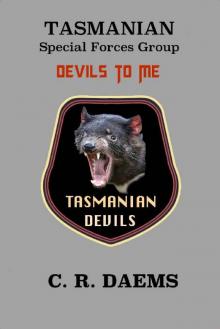 Tasmanian SFG, Book II: Devils to Me (Tasmanian series 2)
Tasmanian SFG, Book II: Devils to Me (Tasmanian series 2) The Red Admiral
The Red Admiral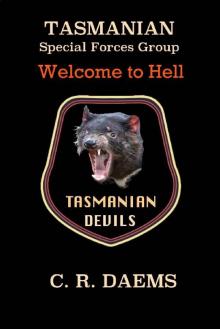 Tasmanian SFG: Welcome to Hell
Tasmanian SFG: Welcome to Hell Megan
Megan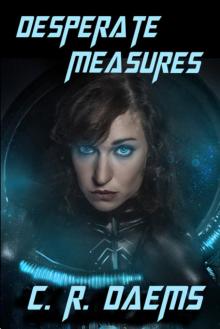 Desperate Measures: The Issog
Desperate Measures: The Issog Red Angel: Coup d'etat (Red Angel Series Book 5)
Red Angel: Coup d'etat (Red Angel Series Book 5) The Shadow Ryana (The Shadow Sisters Book 1)
The Shadow Ryana (The Shadow Sisters Book 1) Riss Series 5: The Riss Challenge
Riss Series 5: The Riss Challenge Red Angel: Book III: Hijackers
Red Angel: Book III: Hijackers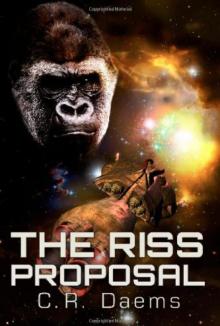 The Riss Proposal: Book II in the Riss Series (Volume 2)
The Riss Proposal: Book II in the Riss Series (Volume 2) The Riss Enemies: Book VI (The Riss Series 6)
The Riss Enemies: Book VI (The Riss Series 6) Hijackers
Hijackers The Shadow Gypsy (The Shadow Sisters)
The Shadow Gypsy (The Shadow Sisters) The Seer Renee
The Seer Renee Kazak Guardians: Book III: Megan (Kazak Guardians Series 3)
Kazak Guardians: Book III: Megan (Kazak Guardians Series 3)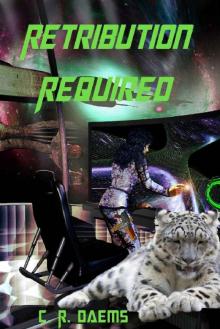 Retribution Required
Retribution Required Riss Series 3: The Riss Survival
Riss Series 3: The Riss Survival The Riss Gamble
The Riss Gamble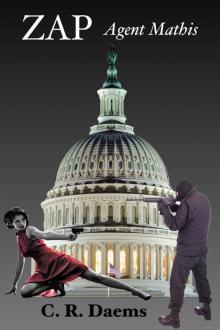 ZAP Agent Mathis
ZAP Agent Mathis The Black Guard: Book II: Evolution (Black Guard Series 2)
The Black Guard: Book II: Evolution (Black Guard Series 2) Zara the Wolf
Zara the Wolf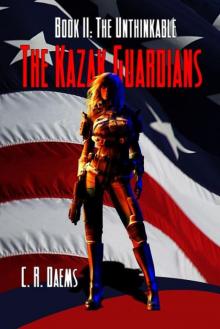 C.R. Daems - Kazak 2 - The Unthinkable
C.R. Daems - Kazak 2 - The Unthinkable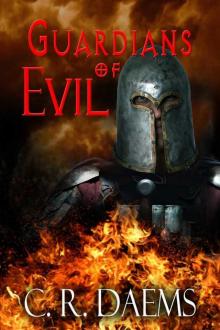 Guardians of Evil
Guardians of Evil Red Angel: Book II: Raiders (Red Angel Series 2)
Red Angel: Book II: Raiders (Red Angel Series 2)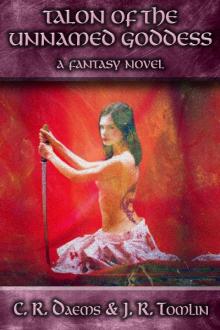 Talon of the Unnamed Goddess, a Fantasy Adventure
Talon of the Unnamed Goddess, a Fantasy Adventure Red Angel
Red Angel Women of Power
Women of Power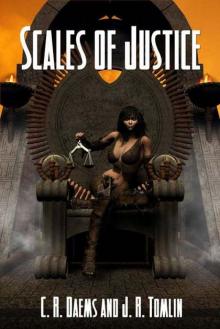 Scales Of Justice
Scales Of Justice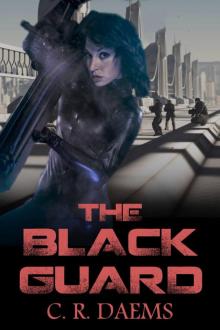 The Black Guard
The Black Guard